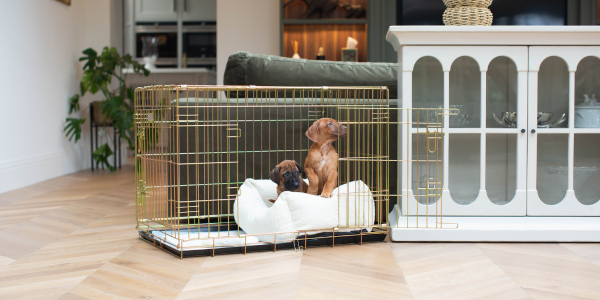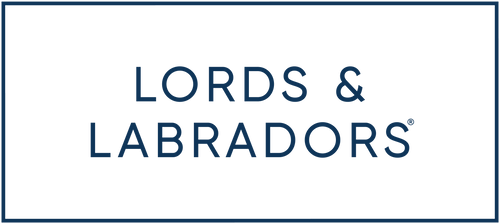Welcome to our guide on cage training your adorable furry friend! We believe that a cage should be a haven for dogs, providing them with a safe, comfortable, and happy space they can call their own. If you've ever wondered about the best time to start cage training, the ideal puppy cage training schedule, or if you can cage train an older dog, fear not! Our pet experts have compiled their top tips to ensure your cage training journey is a smooth and joyful one.
When To Start Cage Training A Puppy
The sooner, the better! It's essential to introduce your puppy to their cage as soon as you bring them home, typically around 8 weeks of age. Early cage training helps them adjust quickly to their new environment, providing a sense of security and assisting with potty training.
Setting Up the Perfect Cage
For cage training, we recommend using our Cozy & Calming puppy cage beds, which fill about half of the cage's space. You can use vet bed or puppy pads on the other half to create a cozy and comforting environment. A cage cover can also help create a consistent sleeping routine for your puppy.

Benefits Of Cage Training:
Crate training offers numerous benefits for your furry friend:
- Provides a safe and calming space, especially in new or stressful situations
- Aids in potty training
- Offers a secure spot when your dog needs some downtime
- Makes traveling easier, as your dog's familiar space can go with you
- Helps with separation anxiety
How To Cage Train A Puppy
Take it slow and steady when cage training your pup. Instead of forcing them into the cage, use treats and toys to encourage them to go in willingly. Keep the cage door open during the day so your puppy can enter and exit as they please, gradually seeing the cage as their cozy den. Never use the cage for punishment or keep them locked inside for extended periods, except for nighttime.

Puppy Cage Training Schedule:
Having a consistent schedule can be immensely helpful during cage training. Here's a sample schedule you can follow:
6 am: Take your puppy out for a potty break and provide playtime in and around the cage
8 am: After breakfast, another potty break and a walk, followed by playtime and a nap with the cage door open
9.30 am: Potty break, playtime, and encourage a nap in the cage
12 pm: Lunchtime with a potty break, a little play, and another cage nap if needed
2 pm: Potty break, playtime, and encourage another nap with the cage door open
5 pm: Potty break after dinner.
6 pm: Potty break, playtime around the cage before bed
How Long Does It Take To Cage Train A Puppy?
Every pup is different, and some may take to their cage immediately, while others may need more time. Be patient and provide reassurance throughout the process. With time and positive reinforcement, your puppy will learn to love their cage and see it as their safe den.
Can You Cage Train an Older Dog?
Absolutely! Cage training is possible for older dogs too. Whether you've recently adopted an older dog or didn't cage train them when they were younger, you can still achieve great results.

How to Crate Train an Older Dog:
Cage training an older dog may require more time and patience than training a puppy. Follow these steps for successful crate training:
- Choose a suitable cage with comfortable bedding. Our cage sets are perfect for building a comfy den
- Approach cage training in a relaxed and positive manner
- Exercise your dog before training to help them relax
- Create positive associations with the cage by using treats and toys
- Gradually encourage your dog to explore the cage and enter voluntarily
- Slowly close the cage door for short intervals and extend the time gradually
- Increase the duration your dog spends in the cage, allowing them to adjust at their own pace
Conclusion
Cage training is a wonderful way to provide your puppy or older dog with a safe and happy space they can call their own. Remember to be patient, use positive reinforcement, and let your furry friend adjust at their own pace. With time and love, your dog will come to cherish their cage as a personal haven. Happy cage training!

